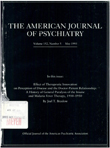Beginning careers in academic psychiatry for women--"Bermuda Triangle"?
Abstract
OBJECTIVE: The proportion of women in leadership positions in academic psychiatry has not kept pace with the increase in the number of women entering the field. This study examines differences in career activities between women and men who graduated from the Yale University psychiatric residency training program and explores whether these differences can be explained by preresidency expectations, residency experiences, or training immediately after residency. METHOD: Departmental educational records of the Yale residency program were reviewed to determine professional interests expressed before psychiatric residency and training focus during residency for 355 residents in the 1970-1983 graduating classes. A 1984 follow-up study focused on their postresidency career activities. Differences in preresidency interests and experiences, training activities, and career paths between all female and male graduates and between women and men who chose academic careers were examined. RESULTS: After residency, the female graduates' marital status differed from men's--more had never married or were divorced. Women's professional activities diverged from men's; their practice pattern was different, they spent more hours teaching, and they had fewer publications in peer-reviewed journals. This divergence was not accounted for by differences in pretraining interests or in training focus during residency. The authors present possible explanations. CONCLUSIONS: Further research is indicated to determine the underlying causes of career differences between women and men in psychiatric practice and academia so that effective strategies for correcting the present inequality of women in senior faculty positions can be implemented.
Access content
To read the fulltext, please use one of the options below to sign in or purchase access.- Personal login
- Institutional Login
- Sign in via OpenAthens
- Register for access
-
Please login/register if you wish to pair your device and check access availability.
Not a subscriber?
PsychiatryOnline subscription options offer access to the DSM-5 library, books, journals, CME, and patient resources. This all-in-one virtual library provides psychiatrists and mental health professionals with key resources for diagnosis, treatment, research, and professional development.
Need more help? PsychiatryOnline Customer Service may be reached by emailing [email protected] or by calling 800-368-5777 (in the U.S.) or 703-907-7322 (outside the U.S.).



